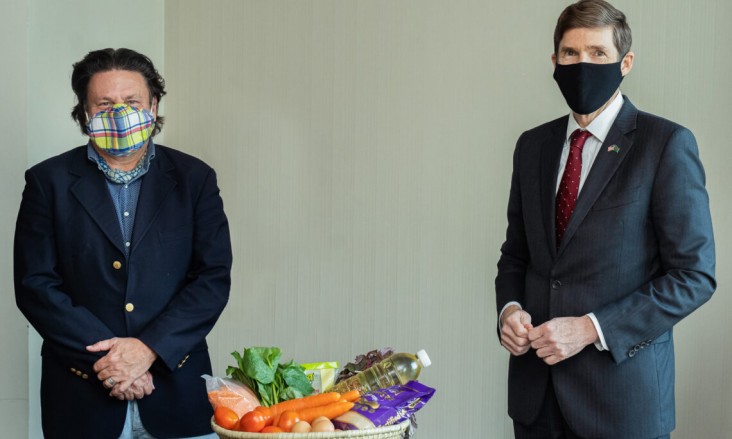Press Release Shim
Speeches Shim

For Immediate Release
DHAKA - Today, United States Ambassador to Bangladesh Earl Miller; Md. Ashraf Ali Khan Khasru, State Minister of the Ministry of Social Welfare; and Richard Ragan, Country Representative of the World Food Programme launched a new $7 million life-saving food assistance project to help poor households in Dhaka at high risk for the novel coronavirus disease (COVID-19). The program will be funded by the U.S. government, through the United States Agency for International Development (USAID), and implemented by the World Food Programme (WFP), the food-assistance branch of the United Nations and the world’s largest humanitarian organization addressing hunger and promoting food security. This program will complement ongoing efforts by the Government of Bangladesh to respond to the COVID-19 pandemic.
The food assistance program will provide aid to 50,000 people living in low-income areas of Kalyanpur and Sattala Bosti by delivering food packages to families who are quarantined due to a family member being ill with COVID-19. Additionally, area residents will receive cash-based transfers for free or low-cost fresh vegetables from Bangladeshi farmers, and other nutritious foods from local vendors. As the program expands, it will work with local farmers, helping to re-establish linkages among families, markets, and local agricultural production.
This critical food assistance initiative will be implemented by the World Food Programme, in partnership with BRAC. As additional funding is received from other donors, WFP plans to expand this pilot project to other urban areas in the country.
This new initiative is part of the latest efforts by the U.S. government to provide assistance to countries responding to the effects of COVID-19. Since the beginning of the outbreak, the U.S. government has committed more than $1.3 billion in emergency health, humanitarian, economic, and development assistance specifically aimed at helping governments, international organizations, and non-governmental organizations (NGOs) fight the pandemic. In Bangladesh, the U.S. government, through USAID alone, has provided nearly $37 million to support COVID-19 response efforts. For a video highlighting U.S. health assistance provided to the people of Bangladesh over the past 20 years, including support for Bangladesh’s COVID-19 response efforts, watch: https://youtu.be/-KyT8VFOfUE.
“No family should face hunger because they are staying in their home to help stop the spread of COVID-19,” said U.S. Ambassador Earl Miller at today’s event.
“This pilot program will help households in these low-income urban areas of Dhaka get the nutritious food they need to stay healthy during these difficult days.”
In addition to USAID support, the U.S. government is providing other vital resources and assistance to respond to the pandemic to Bangladesh, including technical assistance and other support through the U.S. Centers for Disease Control and Prevention (CDC) team based in Dhaka, the U.S. Department of Defense, the U.S. Department of Agriculture and other U.S. agencies. This support is broad, and includes helping custom officials, railway authority and other key personnel critical to ensure the country’s food supply, aiding frontline police and emergency service providers risking their lives to protect everyone living in Bangladesh, and feeding primary school children in areas where undernutrition is common.
The U.S. government, through USAID alone, has provided more than $7 billion in development assistance to Bangladesh since 1971. In 2019, USAID alone provided over $200 million to improve the lives of people in Bangladesh through programs that expand food security and economic opportunity, improve health and education, promote democratic institutions and practices, protect the environment, and increase resilience to climate change.
Related Press Releases
- USAID Signs Joint Statement with Saudi Arabia’s Humanitarian Relief Agency to Co-Fund a Project of the World Food Programme in Cox’s Bazar, Bangladesh
- United States Announces Additional Humanitarian Assistance at the Donor Conference on Sustaining Support for The Rohingya Refugee Response
- USAID Mission Director Visits Sylhet Region to Observe COVID-19 Response Activities and Continuation of Essential Health Service Delivery

Comment
Make a general inquiry or suggest an improvement.